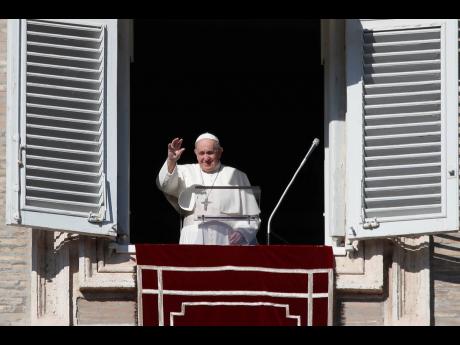Pope’s book backs George Floyd protests, blasts virus sceptics
ROME (AP):
Pope Francis is supporting demands for racial justice in the wake of the US police killing of George Floyd, and is blasting COVID-19 sceptics and media organisations that spread their conspiracies, in a new book penned during the Vatican’s coronavirus lockdown.
In Let Us Dream, Francis also criticises populist politicians who whip up rallies in ways reminiscent of the 1930s, and the hypocrisy of “rigid” conservative Catholics who support them. But he also criticises the forceful downing of historic statues during protests for racial equality this year as a misguided attempt to “purify the past”.
The 150-page book, due out on December 1, was ghost-written by Francis’ English-language biographer, Austen Ivereigh, and at times the prose and emphasis seems almost more Ivereigh’s than Francis.’ That’s somewhat intentional – Ivereigh said Monday he hopes a more colloquial English-speaking pope will resonate with English-speaking readers and believers.
At its core, Let Us Dream aims to outline Francis’ vision of a more economically and environmentally just post-coronavirus world, where the poor, the elderly and weak aren’t left on the margins and the wealthy aren’t consumed only with profits.
But it also offers new personal insights into the 83-year-old Argentine pope and his sense of humour.
At one point, Francis reveals that after he offered in 2012 to retire as archbishop of Buenos Aires when he turned 75, he planned to finally finish the thesis he never completed on the 20th-century German intellectual, Romano Guardini.
“But in March 2013, I was transferred to another diocese,” he deadpans. Francis was elected pope, and bishop of Rome, on March 13, 2013.
The publisher said the book was the first written by a pope during a major world crisis, and Ivereigh said it was done as a response to the coronavirus and the lockdown. For Francis, the pandemic offers an unprecedented opportunity to imagine and plan for a more socially just world.
Message for the US
At times, it seems he is directing that message squarely at the United States, as Donald Trump’s administration winds down four years of ‘America First’ policies that excluded migrants from Muslim countries and diminished US reliance on multilateral diplomacy. Without identifying the US or Trump by name, Francis singles out Christian-majority countries where nationalist-populist leaders seek to defend Christianity from perceived enemies.
“Today, listening to some of the populist leaders we now have, I am reminded of the 1930s, when some democracies collapsed into dictatorships seemingly overnight,” Francis wrote. “We see it happening again now in rallies, where populist leaders excite and harangue crowds, channelling their resentments and hatreds against imagined enemies to distract from the real problems.”
People fall prey to such rhetoric out of fear, not true religious conviction, he wrote. Such “superficially religious people vote for populists to protect their religious identity, unconcerned that fear and hatred of the other cannot be reconciled with the Gospel”.
Francis addressed the killing of Floyd, a black man whose death at the knee of a white policeman set off protests this year across the United States. Referring to Floyd by name, Francis said: “Abuse is a gross violation of human dignity that we cannot allow and which we must continue to struggle against.”
But he warned that protests can be manipulated, and decried the attempt to erase history by downing statues of US Confederate leaders. A better way, he said, is to debate the past through dialogue.
“Amputating history can make us lose our memory, which is one of the few remedies we have against repeating the mistakes of the past,” he wrote.
Turning to the pandemic, Francis blasted people who protested antivirus restrictions “as if measures that governments must impose for the good of their people constitute some kind of political assault on autonomy or personal freedom!”
He accused some in the Church and Catholic media of being part of the problem.
“You’ll never find such people protesting the death of George Floyd, or joining a demonstration because there are shantytowns where children lack water or education,” he wrote. “They turned into a cultural battle what was in truth an effort to ensure the protection of life.”
He praised journalists who reported on how the pandemic was affecting the poorest. But he took a broad swipe at unnamed media organisations that “used this crisis to persuade people that foreigners are to blame, that the coronavirus is little more than a little bout of flu, and that restrictions necessary for people’s protection amount to an unjust demand of an interfering state”.
“There are politicians who peddle these narratives for their own gain,” he writes. “But they could not succeed without some media creating and spreading them.”

